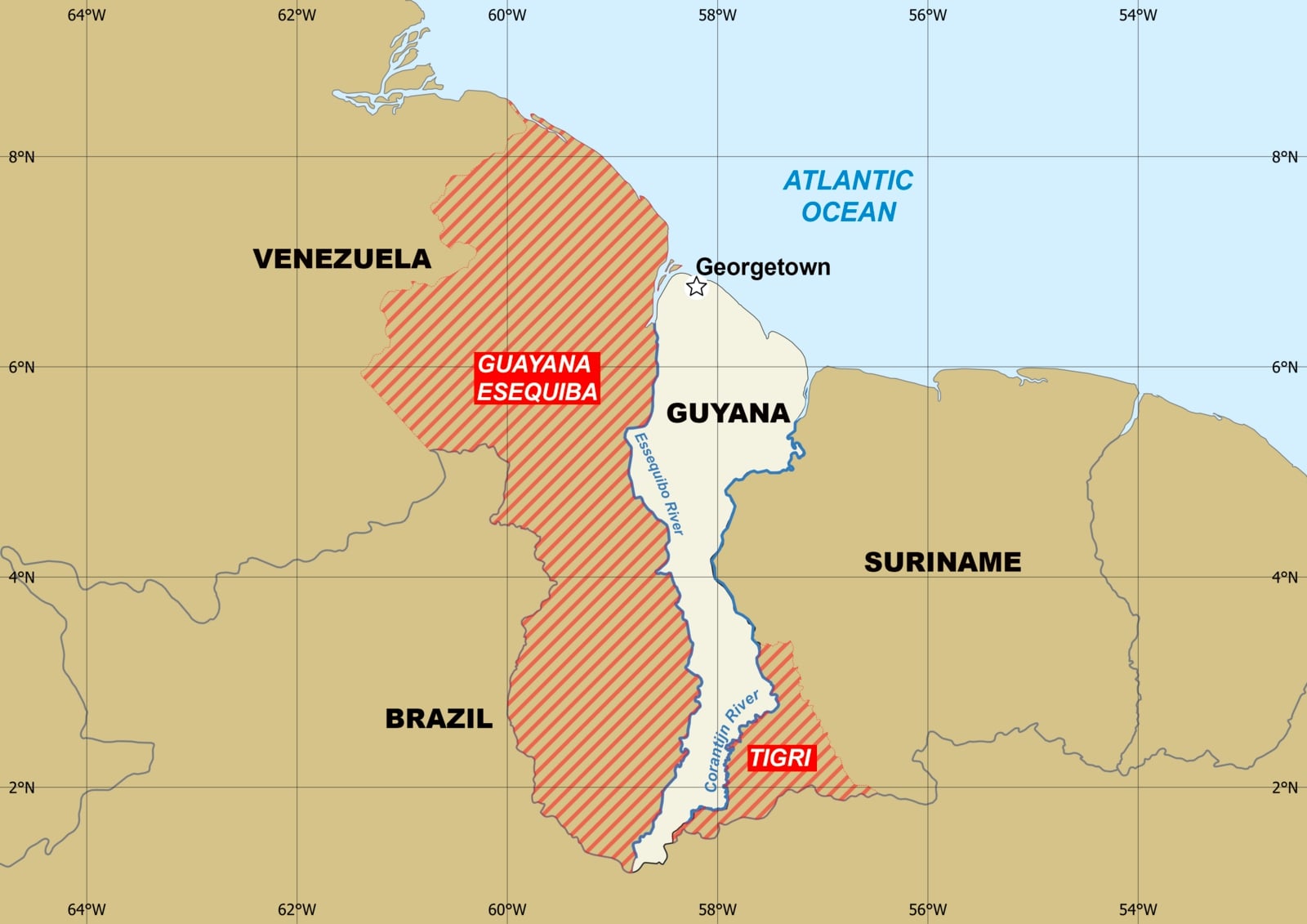South America is at war as Venezuela threatens to forcefully take back the disputed Essequibo territory from Guyana, and the United States (US) is throwing its weight behind it. Washington has conducted military exercises and “air operations” with President Irfan Ali’s armed forces.
US slams China’s ‘aggressive’ actions in SCS after Chinese coast guard fires water cannons at Philippine ships
The dispute centers around the 160,000-sq-km (62,000-sq-mi) heavily forested border area, the Essequibo River, and an offshore area that has recently found massive oil and gas reserves.
Both countries claim ownership of the sparsely populated area, whose highly disputed border was agreed upon under an 1899 decision when Guyana was still part of the British Empire. Venezuelan President Nicolas Maduro’s government rejects the “arbitrary” border it sees as foreign colonial powers.
The United States, for its part, has thrown its weight behind Guyana, in line with its longstanding opposition to Venezuela, which has been under sanctions since the era of late President Hugo Chavez and now his successor, Maduro.
Meanwhile, Venezuela’s President Nicolás Maduro will meet Guyana’s President Mohamed Irfan Ali amid regional disputes, according to a letter from the Prime Minister of St. Vincent and the Grenadines.
“Presidents will meet [the island nation of] Saint Vincent and the Grenadines, Thursday, 14 December 2023, under the auspices of CELAC (Community of Latin American and Caribbean States) and CARICOM (Caribbean Community) on matters related to the border issue between Guyana and Venezuela,” the country’s government said in a statement.
Venezuela should return to ‘territory’
In a statement, the U.S. Embassy in Georgetown said the U.S. Southern Command, which oversees military operations in Central and South America, “will conduct air operations with the Guyanese military” and that the exercises are “part of routine engagement and activities to enhance” (the security partnership between the United States and Guyana).

Caracas views this as foreign military intervention in a territorial dispute. White House national security spokesman John Kirby said Washington supports a peaceful solution to the border dispute that would avoid military intervention.
Brazil has also stepped in to show its opposition to a military conflict that could disrupt the Latin American economy by sending troops to its border with Venezuela.
Any military incursion by Venezuela would be “logistically challenging” because Venezuelan soldiers would have to cross Brazilian territory to enter Essequibo because of challenging terrain elsewhere.
AFP quoted Brazil’s military as strengthening its presence in the region as part of efforts to “guarantee the inviolability of the region”.
Origin of the controversy
But what fueled tensions was a referendum last week in Venezuela where “more than 95 percent of voters” reportedly supported the government’s claim to Essequibo.
Voters also rejected the jurisdiction of the International Court of Justice (ICJ) over the case. Analysts have cited Reuters He said it was Maduro’s attempt to show strength and support for his government ahead of the 2024 presidential election.
A consortium of Exxon Mobil, China’s CNOOC and US Hess began oil production in Guyana in 2019, currently at about 400,000 barrels per day (bpd), expected to rise to more than 1 million bpd by 2027. It has boosted Guyana’s economy drastically and promises to boost its income for years to come.
Although Venezuela sits on the world’s largest crude reserves and massive deposits of natural gas, its production has plummeted in recent years “due to US sanctions, alleged corruption and deteriorating infrastructure.”
Maduro has announced oil exploration in Essequibo with state oil company PDVSA and state iron and steel producer CVG.
Russia is ‘unofficially’, ‘officially’ neutral with Venezuela
Russia, traditionally a close Venezuelan ally, has for its part taken a neutral stance. Foreign Ministry Spokesperson Maria Zakharova said Moscow is “closely following the developments around Essequibo, (which) is a matter of Venezuela-Guyana relations (which) should be resolved in a neighborly way.”
Given previous Russian accusations that the US is meddling in regional conflicts in other parts of the world, its neutral stance could be said to be implicitly critical of Washington. Moscow has long accused Washington of preventing the countries involved from resolving conflicts diplomatically.
However, Moscow has so far not directly named the United States, nor officially exchanged diplomatic or diplomatic contacts with Maduro, indicating it does not want to involve itself indirectly in the dispute. There is no news that Caracas has sought Russian intervention, and Maduro does not want to make it a flashpoint for a more substantial great power rivalry.
Such a move would not even go down well with other South American countries that are hostile to the United States. In other words, Venezuela is essentially isolated in the conflict, with only diplomatic support from Russia and the prospect of confronting the US military’s Southern Command if it seeks force.
Some foreign affairs commentators point to Caracas’ dispute with ExxonMobil, which it sees as arming Guyana’s government. This is also reflected in the administration of Nicolás Maduro, and diplomats have not yet been reported to attack Guyana or President Irfan Ali in their statements.
It can be said that this approach serves as a signal to Guyana that the Caracas dialogue is receptive.

